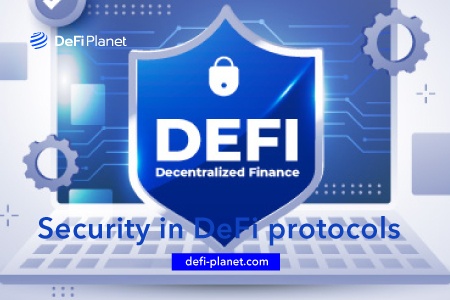Last updated on November 17th, 2022 at 01:54 pm
DeFi, or decentralized finance, enables individuals, merchants, and corporations to conduct financial transactions without intermediaries. This is accomplished through the use of peer-to-peer financial networks, which employ security protocols, connection, software and hardware enhancements, and so on. Unlike typical financial systems, DeFi runs without a central entity controlling the system. DeFi applications use cryptocurrencies to mimic conventional financial systems such as banks and exchanges. DeFi’s popularity has grown significantly in recent years, thus attracting significant volumes of capital.
The DeFi movement promises a slew of advantages for clients and investors. However, it comes with some risks, which we will discuss in this article.
Understanding security risks in the De-Fi ecosystem
Blockchains are sophisticated systems that operate DeFi protocols in the form of code. DeFi can be hacked in many ways because it is dependent on the security of all tiers of the blockchain ecosystem.
Securing a DeFi project involves a comprehensive awareness of the possible dangers that the project may encounter. A comprehensive security audit evaluates the project’s code and environment in which the smart contracts operate.
Identifying security vulnerabilities in the realm of DeFi protocols will aid in providing adequate protection for the enormous investments in DeFi protocols.
Top De-Fi and blockchain security issues
Here are some significant entries on the list of DeFi security risks to be aware of.
Wrong Liquidity Pool Estimates
A liquidity pool is a collection of cryptocurrency assets locked within a smart contract and may be utilized for exchanges, loans, and other purposes.
One of the critical issues associated with liquidity pools is the risk of impermanent loss. It means that, due to the volatility of cryptocurrencies, the fiat value of a user’s crypto assets locked in a pool may decrease over time.
The composition of liquidity pools determines the value of the tokens locked inside them. Attackers exploit this by drastically unbalancing a pool for the period of a transaction, causing the computation of the token’s value to be wrong, allowing the attacker to drain value from the pool.
An example of a protocol exploited in this way is Belt Finance. Faulty assumptions about the value of a token inside a liquidity pool have plagued DeFi protocols in recent months, resulting in millions of dollars in losses.
Compromised Private Keys
Another security issue with DeFi is stolen or leaked private keys. Blockchain protocols utilize cryptography to regulate and manage access to blockchain accounts.
Private keys are used to generate digital signatures that can be validated without disclosing the private key. They are also used in Bitcoin transactions to demonstrate ownership of a blockchain address. Private keys can be stolen or leaked in many ways. Some of which include:
- Compromised MetaMask Interface: MetaMask is a popular application designed for interacting with and transacting on the Ethereum network. Several DeFi projects and individuals have reported crypto losses as a result of utilizing malicious versions of MetaMask.
- Mnemonic Phrase Leaked/Stolen: Mnemonic phrases are a popular approach to make private keys easier to remember or enter while recovering or setting up a new wallet. Some DeFi-related attacks have resulted from the theft or unintentional disclosure of these keys.
- Poor Key Generation: A secure random number generator should be used to generate private keys. If these keys are created incorrectly using a low-quality random number generator, an attacker will most likely be able to guess them and seize control of a blockchain account.
Frontrunning Attacks
A front-running attack occurs when a malicious node views a transaction after it has been broadcast but is still incomplete. The malicious node then attempts to validate its transaction before or in place of the observed transaction.
Transactions are not instantly added to the ledger by blockchains. Upon formation, they are broadcast throughout the blockchain network. Then the transactions are stored in each blockchain node’s mem pool before being added to the ledger in blocks.
The time lag between the generation of a transaction and its entry in the ledger allows for front-running attacks. The attacker (often a bot) will hunt for transactions to exploit (taking advantage of Miner Extractable Value).
If they come across one, they generate their version of the transaction with a higher transaction charge and send it to the network. Because miners sometimes rank transactions in blocks depending on transaction fees, the attacker’s transaction occurs before the original one, allowing them to profit.
Front-running has far-reaching implications for DeFi security. Bots exploit front-running to profit from foreknowledge of user transactions. While this is potentially damaging in many ways, bots do occasionally fail in their attempts to outrun humans.
Rug Pulls
Most attacks on DeFi protocols result from external threats. However, this is not always the case. In some scenarios, DeFi users get compromised by the protocol’s creators and owners.
A rug pull occurs when developers drain investors’ funds and abandon the project after a significant sum has been committed to the bogus crypto or DeFi project, leaving victims with limited options for resolution.
In many cases, distinguishing between blockchain hacks and rug pulls may be difficult.
Inefficient Access Control
Several DeFi smart contracts include privilege features. These functions are intended to be called only by the contract’s owner, and access restrictions are in place to ensure this. Access is often managed by specifying that calls to a function must be made by one or more addresses from a collection of addresses.
Surprisingly, access controls are either poorly implemented or not deployed at all, allowing attackers access. By exploiting a smart contract, hackers can gain privileged access to it and extract value.
51% Attacks
The 51% attack is perhaps the most well-known vulnerability in blockchain security. The attack is typically linked to Proof-of-Work schemes.
Blockchains apply the longest chain rule to remove conflicting blockchain versions. Whatever version of a divergent blockchain develops faster, has more computational power, and wins.
In a 51% attack, an attacker gains control of the majority of the blockchain’s computational power. This allows them to make their version of the blockchain grow faster than the legitimate one, replacing it under the longest chain rule and allowing them to rewrite the distributed ledger’s contents at will, enabling double-spend attacks.
As a blockchain network expands, performing 51% of attacks becomes more difficult.
Smart Contract Audits For DeFi Protocols
A smart contract audit requires engineers to analyze the code that is used to underwrite the smart contract’s conditions. This audit also allows developers to identify any possible faults or vulnerabilities before deploying the smart contract. A smart contract security audit evaluates and comments on a project’s smart contract code.
Why Should DeFi Protocols Consider Smart Contract Audits?
Smart contract audits are required to address the security vulnerabilities inherent in decentralized finance. They aid in identifying flaws and threats, resolving vulnerabilities, and verifying contracts.
A smart contract audit protects customers while also increasing the project’s reliability. Smart contracts are appealing targets for malicious cyberattacks because of the massive amounts of money that may be exchanged or locked in them. Minor programming errors can result in the theft of enormous amounts of money.
For example, the DAO breach on the Ethereum blockchain resulted in the loss of around 3.6M Ether and a modification in the Ethereum network.
Because blockchain transactions are irreversible, ensuring the security of a project’s code is vital. The highly secure nature of blockchain technology makes it difficult to retrieve funds and resolve issues. It is better to prevent vulnerabilities at all costs.
Conclusion
- DeFi, or decentralized finance, allows the execution of financial transactions without the involvement of intermediaries. Peer-to-peer financial networks use security protocols, connections, software, and hardware upgrades to accomplish this.
- To secure a DeFi project, a comprehensive security audit must be performed, which analyzes the code of a project or smart contract for potential threats that the project may encounter.
- Some of the significant entries on the list of DeFi security issues include- Wrong Liquidity Pool Estimates, Compromised Private Keys, Frontrunning Attacks, Rug Pulls, Inefficient Access Control, and 51% Attacks.
If you want to read similar news articles like this, follow DeFi Planet on Twitter, Facebook and LinkedIn.





















